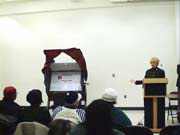Jersey City held the first of five voter education drives aimed at educating voters about new electronic voting machines recently acquired by Hudson County.
The new machines were funded in part by the Help America Vote Act (HAVA) which also requires first-time voters to provide two forms of identification. They will start being used this April throughout the county for the school board elections.
About 200 residents attended Tuesday’s training session, which was the first of its kind in Hudson County, at the Mary McCleod Bethune Community Center at 140 Martin Luther King Drive. An example of the new Sequoia AVC Advantage machine was on hand while county officials demonstrated its use.
An easier process
“This is simple,” said Deputy Superintendent of Elections John Brzozowski, “there are no more levers to pull and no more curtains to open and close.”
Brzozowski explained the basics of the new machines before walking each participant through the process using the sample machine.
“The layout isn’t much different from the print machine,” said Hudson County Superintendent of Elections Marie Borace.
Once in the voting booth, voters are presented with the entire ballot, so they have the ability to review all the offices in front of them. Voters press a button on the ballot which lights an X next to the choice. There is also a display which spells out who was voted for. The machine only allows one vote per office, and will notify a voter who misses an option.
In with the new
Borace began looking into replacing the county’s 60-year-old voting machines when she took office in 1998. “The old ones, it was difficult to get parts for,” she said. “We’d lose wheels after each election. They needed repairs more and more often.”
She saw the Sequoia machines at a New Jersey Association of Election Officials seminar. Nine counties in New Jersey used the machines at the time.
“I went to Bergen and Union Counties who had them, spoke to the mechanics and technicians, and made my decision,” she said. “I presented it to the freeholders and they saw it and liked it.”
The 600 new machines cost the county $4 million. HAVA, passed on January 1, appropriated $3.6 billion in federal monies for local governments to buy new machines.
“We offered all the old machines to the mayors, and the rest are going up for bid,” she said.
Jersey City kept two of the old machines, one of which will be displayed at the Jersey City Museum for educational purposes.
A need to verify
Lawmakers have raised concerns that the new touch-screen machines do not offer a hard copy verification of voters’ choice, and that the final outcome may be subject to tampering or malfunction.
Representative Rush Holt drafted a bill, HR 2239, which would require that all electronic voting machines produce a printed record so voters can see their votes as they are recorded.
“This measure will require a printout receipt so that each voter can verify that their vote was counted,” said Jeff Lieberson, Press Secretary for Congressman Steve Rothman, one of 108 co-sponsors of the bill. “Logistically, you’d be able to verify that your vote was recorded the way you cast it. It’s a safety mechanism. The possibility for some sort of tampering or malfunction could exist. This is a way to ensure that the vote recorded is being printed out on paper and the voter has verification that the vote is accurate.”
William Kingman, vice president of the Northeast Region of Sequoia Voting Systems, says the company has taken measures to ensure accuracy.
“The ballot is recorded in three different positions in the machine,” said Kingman. “It is stored in random order, so a person later on can’t determine what order it was voted in [to figure out who voted for who]. We retain a ballot image of every vote, and it can be provided at the end of the election that it will print out every vote that was cast [instead of a total] in random order.”
There are 30,000 Sequoia machines operating in the country, including 5,000 in New Jersey. Kingman said although they will provide attachments to address whatever legislation comes up, they cannot predict what the law may turn out to be.
“There are no [state or federal] standards at this moment and no requirement,” said Kingman. “If and when that becomes a law, Sequoia is committed to providing that. It will be an addition to the machine.”
City officials expect to use the new machines for the April School Board elections
Another session will be held on Feb. 4 at Our Lady of Mercy on Sullivan Street, Feb. 10 at Fairmount senior housing complex on Fairmount Avenue, and March 4 at the Hudson County AARP office on Summit Street.
